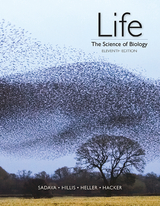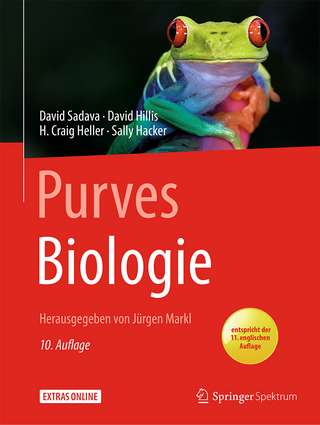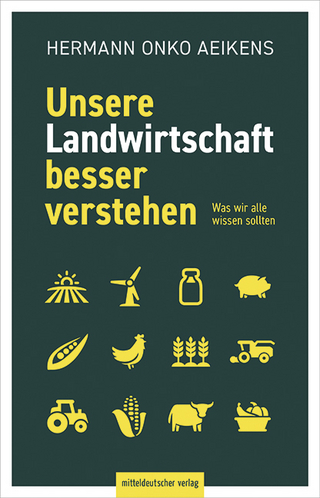
Life
W.H.Freeman & Co Ltd (Verlag)
978-1-4292-9864-3 (ISBN)
- Titel ist leider vergriffen;
keine Neuauflage - Artikel merken
- SCIENTIFICALLY, with a wealth of important new research throughout (see Table of Contents for highlights)
- TECHNOLOGICALLY, with instant access QR codes printed in the text, new interactive features (media clips, chapter summaries, a flashcard app), and a dramatically enhanced BioPortal, with the adaptive quizzing system, LearningCurve
- QUANTIFIABLY, with completely revised assessment resources and new ways of measuring students' progress
Also avalable, Volume Splits: --paperbound in full color!
Volume 1: The Cell and Heredity (Chapters 1-20)
Volume 2: Evolution, Diversity, and Ecology (Chapters 1, 21-33, 54-59)
Volume 3: Plants and Animals (Chapters 1, 34-53)
See what's in the LaunchPad
David E. Sadava is the Pritzker Family Foundation Professor of Biology, Emeritus, at the Keck Science Center of Claremont McKenna, Pitzer, and Scripps, three of The Claremont Colleges. In addition, he is Adjunct Professor of Cancer Cell Biology at the City of Hope Medical Center. Twice winner of the Huntoon Award for superior teaching, Dr. Sadava has taught courses on introductory biology, biotechnology, biochemistry, cell biology, molecular biology, plant biology, and cancer biology. In addition to Life: The Science of Biology, he is the author or coauthor of books on cell biology and on plants, genes, and crop biotechnology. His research has resulted in many papers coauthored with his students, on topics ranging from plant biochemistry to pharmacology of narcotic analgesics to human genetic diseases. For the past 15 years, he has investigated multi-drug resistance in human small-cell lung carcinoma cells with a view to understanding and overcoming this clinical challenge. At the City of Hope, his current work focuses on new anti-cancer agents from plants. David M. Hillis is the Alfred W. Roark Centennial Professor in Integrative Biology at the University of Texas at Austin, where he also has directed the Center for Computational Biology and Bioinformatics and the School of Biological Sciences. Dr. Hillis has taught courses in introductory biology, genetics, evolution, systematics, and biodiversity. He has been elected to the National Academy of Sciences and the American Academy of Arts and Sciences, awarded a John D. and Catherine T. MacArthur Fellowship, and has served as President of the Society for the Study of Evolution and of the Society of Systematic Biologists. He served on the National Research Council committee that wrote the report BIO 2010: Transforming Undergraduate Biology Education for Research Biologists, and currently serves on the Executive Committee of the National Academies Scientific Teaching Alliance. His research interests span much of evolutionary biology, including experimental studies of evolving viruses, empirical studies of natural molecular evolution, applications of phylogenetics, analyses of biodiversity, and evolutionary modeling. He is particularly interested in teaching and research about the practical applications of evolutionary biology. H. Craig Helleris the Lorry I. Lokey/Business Wire Professor in Biological Sciences and Human Biology at Stanford University. He has taught in the core biology courses at Stanford since 1972 and served as Director of the Program in Human Biology, Chairman of the Biolo-gical Sciences Department, and Associate Dean of Research. Dr. Heller is a fellow of the American Association for the Advancement of Science and a recipient of the Walter J. Gores Award for excellence in teaching and the Kenneth Cuthberson Award for Exceptional Service to Stanford University. His research is on the neurobiology of sleep and circadian rhythms, mammalian hibernation, the regulation of body temperature, the physiology of human performance, and the neurobiology of learning. He has done research on a huge variety of animals and physiolo-gical problems, including from sleeping kangaroo rats, diving seals, hibernating bears, photo-periodic hamsters, and exercising athletes. Dr. Heller has extended his enthusiasm for promoting active learning via the development of a two-year curriculum in human biology for the middle grades, through the production of Virtual Labs interactive computer-based modules to teach physiology. May Berenbaum is the Swanlund Professor and Head of the Department of Entomology at the University of Illinois at Urbana-Champaign. She has taught courses in introductory animal biology, entomology, insect ecology and chemical ecology and has received awards at the regional and national levels teaching from the Entomological Society of America. A fellow of the National Academy of Sciences, the American Academy of Arts and Sciences, and the American Philosophical Society, she served as President of the American Institute for Biological Sciences in 2009 and currently serves on the Board of Directors of AAAS. Her research addresses insect-plant coevolution from molecular mechanisms of detoxification to impacts of herbivory on community structure. Concerned with the practical application of ecological and evolutionary principles, she has examined impacts of genetic engineering, global climate change, and invasive species on natural and agricultural ecosystems. In recognition of her work, she received the 2011 Tyler Prize for Environmental Achievement. Devoted to fostering science literacy, she has published numerous articles and five books on insects for the general public."
| Zusatzinfo | Illustrations |
|---|---|
| Sprache | englisch |
| Maße | 235 x 283 mm |
| Gewicht | 454 g |
| Themenwelt | Naturwissenschaften ► Biologie |
| ISBN-10 | 1-4292-9864-2 / 1429298642 |
| ISBN-13 | 978-1-4292-9864-3 / 9781429298643 |
| Zustand | Neuware |
| Haben Sie eine Frage zum Produkt? |
aus dem Bereich



